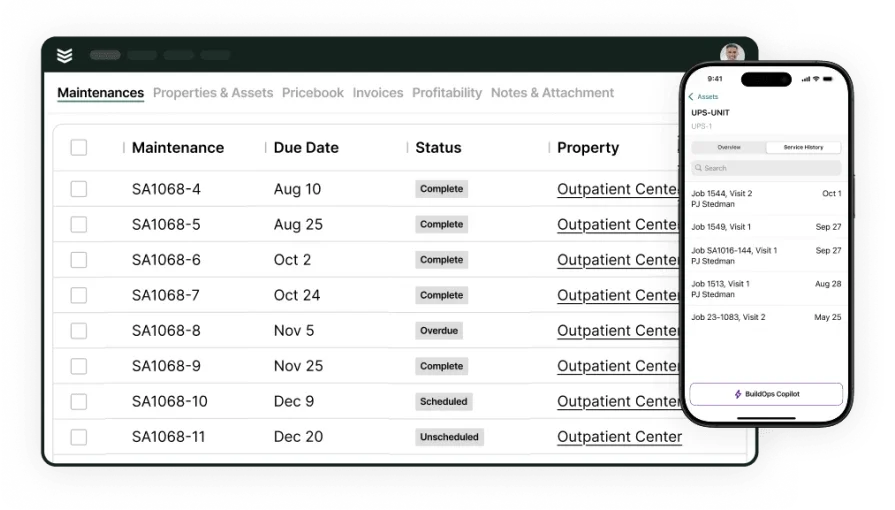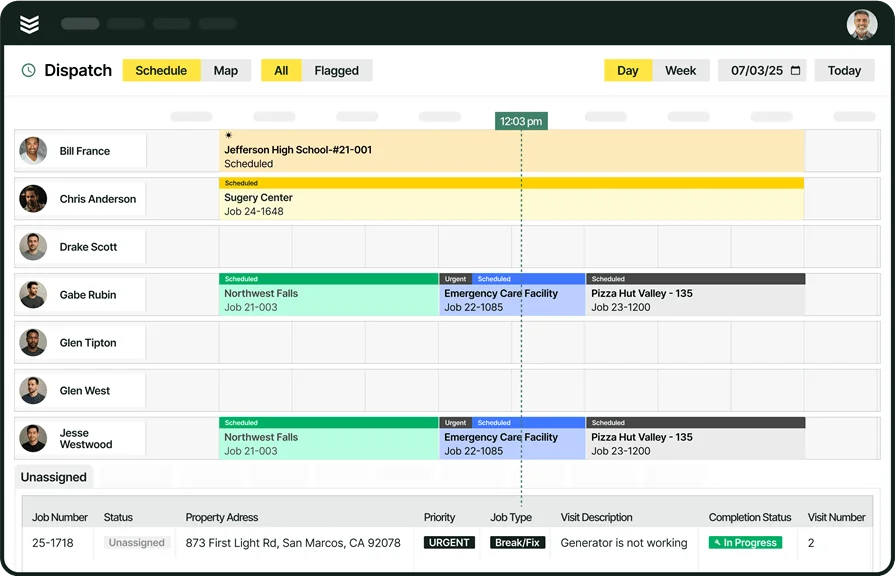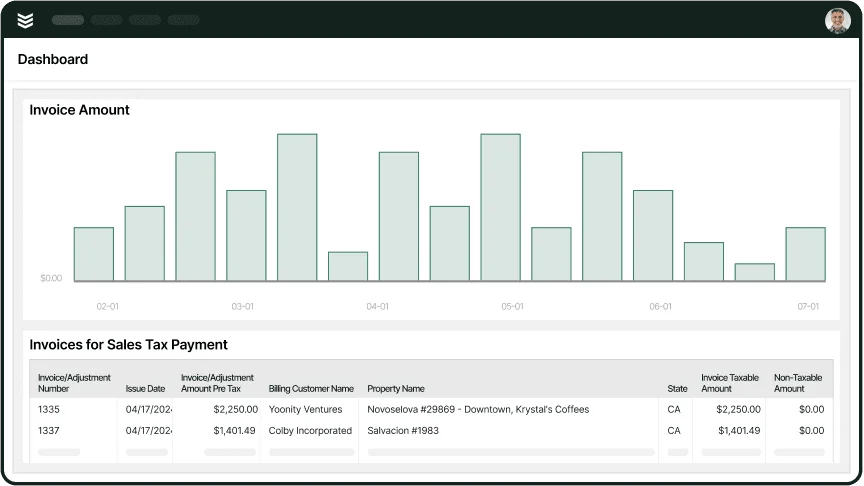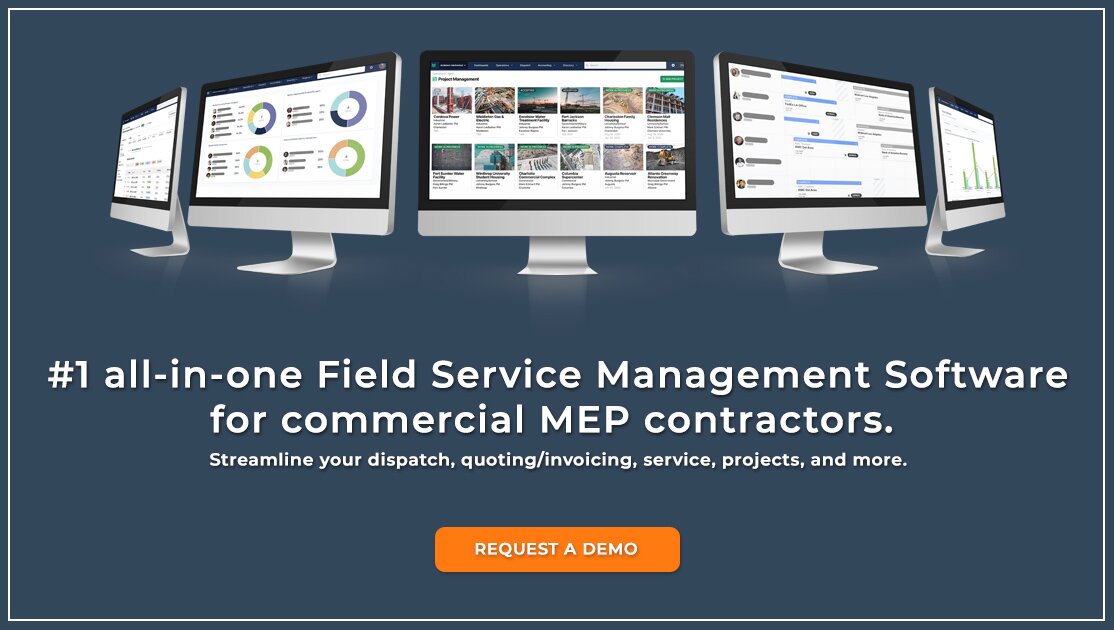Running a field service business means managing chaos daily—work orders, techs in the field, customer calls, parts tracking, and more. It doesn’t take much for things to fall through the cracks. That’s where a reliable field service management platform comes in. These platforms act as command central for everything your team needs to get jobs done—without wasting time jumping between tools or chasing down updates.
From dispatching and asset tracking to customer communication and reporting, a strong field service platform gives your business structure. If you’re already exploring what field service management involves, this guide takes it further by breaking down the best platforms that help you do the job right.
Here’s what we’ll cover to help you find a platform that fits the way your business works:
- The essentials of a field service management platform
- Top field service platform features to look for & evaluate
- Choosing the right field service platform for your team
- 20 best field service platforms & tools to explore
- 5 benefits of using a field service platform
- Other field service platforms by trade & industry
Each section tackles a different piece of the puzzle—what platforms actually do, what they cost, who they’re made for, and what separates a good one from a great one. If you’re thinking about switching platforms or just getting started, this guide lays out the info you need to make a smart call.
The essentials of a field service management platform
Before you dive into feature comparisons or vendor demos, it’s worth getting familiar with how these tools actually fit into the day-to-day of a field service business. There are all kinds of field service management solutions available—each designed to tackle different operational challenges, industries, and team sizes.
This section breaks down the core elements of a field service management platform, who uses it, what it typically costs, and how it helps managers stay ahead of the chaos.
Let’s start with the foundation.
What is a field service management platform?
A field service management platform is a digital system used to organize, coordinate, and track all aspects of field service operations—technicians, jobs, equipment, schedules, and customer interactions—from one centralized dashboard. It helps field and office teams stay aligned in real time.
It gives both office staff and field crews access to the same real-time data, so teams can move faster, avoid miscommunication, and deliver better service. For larger teams or companies managing high job volumes or multiple locations, this kind of platform isn’t a nice-to-have—it’s a necessity.
How much does field service management platforms cost?
Most field service software is priced per user, per month—typically ranging from $40 to $300 depending on the platform’s features, level of customization, and the size of your team. Some platforms offer flat rates for unlimited users, while others charge based on the number of technicians, locations, or even service calls handled per month.
But pricing isn’t always straightforward. The cost of a field service management platform can also include onboarding fees, training packages, or optional add-ons like GPS tracking and advanced reporting. Enterprise solutions may even require a custom quote based on the scale and scope of your operations.
Deep Dive
To help make sense of it all, we broke down real-world pricing models in our full guide on field service software pricing, covering how vendors structure their plans, which features tend to increase costs, and what questions to ask during a demo. If you’re comparing options, it’s a solid place to start.
Who uses field service management platforms?
A field service management platform supports nearly every role in a service business—not just the people in the field. It gives teams a single system to coordinate jobs, communicate clearly, and keep operations moving. Here's how different roles use it every day:
- Field technicians - Access job details, update progress, capture photos, and complete paperwork right from the field. It helps them focus on the job without extra calls or confusion.
- Dispatchers and schedulers - Assign jobs, adjust schedules in real time, and keep techs moving without delays. A visual board gives them a clear view of every job and technician in play.
- Office administrators - Manage billing, customer records, service histories, and follow-ups in one place. Less paper shuffling, fewer errors, and faster response times.
- Field service contractors - Track job progress, balance workloads, and step in when issues arise. Real-time visibility means fewer surprises and better decision-making in the field.
- Business owners and executives - Review performance metrics, analyze trends, and spot gaps across the operation. The platform brings key data into focus so leadership can act fast.
Let’s take a closer look at how field contractors actually use these platforms to keep jobs running smoothly.
How contractors use field service platforms to improve operations
Contractors in the field carry a heavy load—coordinating crews, managing schedules, handling customer updates, and making sure work gets done right the first time. A field service platform helps cut through the noise by giving them real-time visibility and control over daily operations. Here's how it makes a difference:
- Assign the right techs to the right jobs - View availability, skillsets, and proximity to quickly match techs with the work they’re best suited for—without delays or guesswork. This prevents overloading your top performers and ensures each job is handled by someone qualified from the start.
- Plan smarter routes - Optimize travel between job sites to reduce fuel costs, avoid backtracking, and fit more work into each day. With route planning tools built in, dispatchers and contractors can make adjustments on the fly and respond faster when schedules change.
- Keep teams aligned in real time - Share job details, updates, and last-minute changes instantly between the office and field. No more phone tag or outdated instructions. Everyone—from techs to admins—works from the same live system, which cuts miscommunication and repeat visits.
- Track time and job progress - Monitor clock-ins, job durations, and task completion to keep jobs on schedule and spot issues before they snowball. It also gives you better data for payroll, performance reviews, and job costing—without chasing down timecards.
- Make reporting fast and accurate - Collect job data, photos, and notes from the field and turn them into clean reports or invoices without extra admin work. This speeds up billing, reduces errors, and gives customers a professional, detailed record of the work completed.
Top field service platform features you need
Not every platform offers the same tools—and not every company needs the same setup. Some focus on basic dispatching, while others are built to handle complex multi-day projects or multiple teams across job sites. This section breaks down the core features that matter most when evaluating a field service management platform—from everyday essentials to deployment models and long-term planning tools.
Core capabilities to look for
A strong field service platform should cover the full lifecycle of a job—from the first call to the final invoice. Here are some of the most important capabilities to keep an eye on:
- Job scheduling and dispatching - Assign techs with just a few clicks, track availability, and handle changes in real time. Look for drag-and-drop boards, skill-based filters, and smart alerts to avoid double-booking.
- Estimates and quoting - Quickly build quotes based on labor, materials, travel time, and past jobs. Many platforms let you convert approved estimates directly into scheduled work orders.
- Time tracking and job logs - Let techs clock in and out, record time on-site, and log key details as they go. This data feeds into payroll, performance reviews, and long-term job costing.
- Invoicing and payments - Create and send invoices directly from the platform, often using data pulled from job logs. Some platforms offer built-in payment processing or integrations with tools like QuickBooks.
- Reporting and analytics - Track job volume, average completion time, first-time fix rates, and more. Insights like these help identify bottlenecks and make better decisions for staffing and resource planning.

Explore our service management suite
Equip your team with the tools they need to get jobs done fast and effectively.
Platforms features
Not every team runs the same way—some need to access job info from the field, while others prefer everything stays in-house. The way your field service platform is accessed plays a big role in how well it fits into your daily workflow. Here are the most common setups:
- Cloud-based platforms - These are hosted online and accessible from anywhere with an internet connection. They’re easy to roll out, automatically updated, and don’t require expensive hardware or servers. Cloud platforms work well for teams that need flexibility—especially those with multiple crews in the field or remote office staff. You get real-time updates, instant data syncing, and the ability to log in from virtually any device.
- On-premise platforms - Installed directly on your company’s own servers or office machines, this setup gives you more control over how and where your data is stored. It’s often preferred by businesses with strict security policies or limited internet access. While it offers peace of mind with localized control, it usually comes with higher upfront costs and ongoing maintenance handled by in-house or contracted IT teams.
- Mobile apps - A strong field service platform will include a mobile version that techs can use in the field. These apps streamline job check-ins, photo uploads, time tracking, notes, and even on-the-go invoicing. Having mobile access isn’t just a convenience—it’s essential for contractors who spend their day moving between sites and need the full job picture without calling back to the office. A mobile-first design also helps speed up workflows and reduce delays caused by miscommunication.
Work & business type features
Field service companies vary in the kind of work they do and how they operate. Some focus on one-off service calls, while others handle complex projects or manage recurring maintenance contracts. A well-rounded field service platform offers tools that support these different workflows and help teams stay organized, efficient, and responsive on the job.
- Service order management - Keep customer requests, job details, scheduling, and billing in one place. This helps teams stay aligned from first contact through to final payment, with fewer dropped handoffs or missing details.
- Work order tracking - Assign jobs, monitor progress, and log what was done—by who, where, and when. This keeps your team on task and provides a clear audit trail for follow-ups, inspections, or reporting.
- Project coordination - Larger jobs often span multiple days, teams, or trades. With the right features, contractors can manage timelines, assign tasks across phases, and stay ahead of delays or resource conflicts.
- Contract and agreement tools - For service agreements, recurring work, or multi-year maintenance plans, platforms with built-in contract features help track terms, automate scheduling, and manage renewals without the extra paperwork.
- Customer relationship management (CRM) - A built-in CRM keeps contact details, service history, preferences, and feedback in one system. That makes it easier to deliver timely service, build stronger client relationships, and spot upsell opportunities.
Asset and resource tracking features
Keeping track of your tools, vehicles, and techs is just as important as scheduling the work itself. A solid field service management platform helps you manage the resources that keep your jobs moving—so nothing gets lost, delayed, or overlooked. These features bring clarity to what’s available, where it’s located, and how it’s being used in the field.
- Inventory tracking - Monitor parts, tools, and materials in real time. Platforms with inventory tools help flag low stock, automate reorders, and prevent delays from missing equipment.
- Fleet visibility - Know where your vehicles are, how they’re being used, and when they need maintenance. GPS tracking, usage logs, and condition reports give you full control over your fleet.
- Technician status - See which techs are available, what jobs they’re working on, and how they’re progressing—all from a single dashboard. This makes it easier to assign work, adjust schedules, and react to changes without back-and-forth phone calls.
- Job site data capture - Let techs log job notes, photos, equipment use, and site-specific details while they’re on location. These records are stored automatically, making it easier to verify work, build reports, and support follow-ups.
- Tool condition and usage tracking - Some platforms go a step further by monitoring the wear and usage of specific tools—helping you plan maintenance, reduce downtime, and extend the life of your gear.
Deep Dive
Want a deeper breakdown of which platform types match your business model? Check out our guide on the different types of field service management software.
Choosing the right field service platform for your team
No two field service operations run exactly the same. Your industry, team size, and workload shape what kind of field service platform will actually support your business day-to-day. Instead of chasing shiny features, start by focusing on the fundamentals—how the platform fits your work, scales with your growth, and connects to the tools your team already uses.
Here are key factors to help guide your decision:
- Industry focus - Look for platforms that support the type of work you do—whether that’s HVAC, plumbing, fire safety, electrical, or another specialty. Industry-specific tools and templates can save serious time and reduce errors.
- Job complexity - Some platforms are geared toward simple one-off service calls, while others are built for managing multi-phase projects or recurring maintenance contracts. Think about the kind of jobs your team handles most often.
- Scalability - Can the platform grow with your business? Whether you’re adding new techs, opening another location, or expanding service lines, the platform should be able to handle the next phase without forcing a full rebuild.
- Cost structure - Pricing varies widely—some charge per user, others by job volume or monthly tiers. Make sure you understand the full cost picture, including setup fees, training, and what’s actually included in each pricing tier.
- Built-in tools - What does the platform include out of the box? Scheduling, dispatching, invoicing, asset tracking, mobile access—check that the tools match your daily workflow without requiring expensive add-ons.
- Integrations - A good field service platform should connect to your other systems—accounting, CRM, GPS, and more. Seamless integrations reduce data entry and keep your team working from one source of truth.
- Access model - Whether cloud-based, in-house, or mobile-first, the way you access your platform impacts speed and flexibility. Choose a setup that supports your team wherever the work gets done.
- Ease of use - A powerful platform won’t help much if your team struggles to use it. Consider how long it takes to train users, navigate the system, and complete routine tasks without frustration.
There’s a lot to weigh when picking a field service management platform—and the best choice depends on how your business runs today and where you’re heading next. To help narrow things down, we’ve put together a list of top platforms that contractors trust across different industries and job types.
20 best field service platforms & tools to explore
There’s no one-size-fits-all when it comes to choosing a field service management platform. The best option depends on the type of work you handle, the size of your team, and how you run your business. Some platforms are built for large commercial contractors juggling multi-site jobs, while others are tailored for residential service calls or niche trades.
To make the search easier, we’ve organized 20 top field service platforms by use case—so you can zero in on the ones that fit how your team actually works.
5 best field service platforms for commercial contractors
Commercial contractors face a different kind of pressure—multi-site projects, demanding service agreements, and large field teams that need to stay in sync. The right field service management platform helps manage all of it, giving contractors real-time visibility into jobs, assets, and schedules. These platforms are built to support the complexity and scale that commercial work demands, without sacrificing speed or clarity.
1. BuildOps
BuildOps is purpose-built for commercial contractors managing complex jobs across multiple properties. It connects job tracking, dispatching, asset management, and customer history into one platform with real-time updates. With features focused on multi-site operations, recurring service contracts, and technician efficiency, it’s tailored for commercial workflows—not retrofitted like other tools.
Industry specializations: HVAC, refrigeration, electrical, plumbing, fire safety
How pricing works: Per-month cost based on the number of users; set up a demo for a personalized quote
What sets it apart: Real-time scheduling and customer hierarchy tools built for commercial job flow
Key features:
- Smart CRM with asset hierarchies for property-based service
- AI-assisted mobile tools for fast reporting and invoicing
- Dispatch board with live technician status and job updates

Take a closer look at BuildOps
We help commercial teams keep field techs aligned while out on the job.
2. Commusoft
Image Source: Commusoft
Commusoft helps contractors automate scheduling, customer messaging, and job tracking—especially for recurring or preventative maintenance jobs. It’s a solid choice for companies handling facility management or multi-trade work. That said, its sales and marketing tools are sold separately, and pricing flexibility can be limited when scaling up.
Industry specializations: HVAC, plumbing, electrical, facility management, appliance repair
How pricing works: Daily, monthly, or annual licenses; contact for quote
What sets it apart: Intuitive drag-and-drop scheduling board with powerful filtering options
Key features:
- Recurring job scheduling templates
- Offline access for field teams
- Customer notifications with job progress updates
3. Fieldpoint
Image Source: Fieldpoint
Fieldpoint is a robust platform geared toward asset-heavy industries with long-term service requirements. It includes deep work order tracking, subcontractor coordination, and advanced analytics. Contractors in fields like building automation, fire protection, and IT services benefit most from its project-level visibility. However, the learning curve can be steep for smaller teams without dedicated training resources.
Industry specializations: HVAC, fire safety, IT, medical devices, industrial services
How pricing works: Contact for demo and quote
What sets it apart: Strong asset scheduling and job costing built for complex, multi-day service work
Key features:
- Work order automation and subcontractor tracking
- Job costing and financial performance reporting
- Scalable for larger field service teams
4. Service Fusion
Image Source: Service Fusion
Service Fusion offers a straightforward platform for managing quotes, dispatching, scheduling, and payments—all in one place. It’s designed to support a wide range of service trades and includes features like VoIP integration, GPS tracking, and unlimited users on all plans. However, it lacks deeper project management and reporting tools that may be needed for more advanced commercial operations.
Industry specializations: HVAC, plumbing, electrical, refrigeration, locksmithing, landscaping, home services
How pricing works: Flat monthly or annual rate with unlimited users; contact for tier details
What sets it apart: Affordable pricing with built-in fleet tracking and communication tools
Key features:
- VoIP phone system integration
- Technician skill tagging and service zone mapping
- Cloud access with mobile support for field techs
5. ServiceTrade
Image Source: ServiceTrade
ServiceTrade is designed with commercial contractors in mind, especially those working in fire safety, HVAC, and other recurring service trades. The platform includes strong tools for managing long-term customer relationships, scheduling repeat visits, and organizing service history. While it handles communication and maintenance scheduling well, it lacks more advanced project management and reporting tools that some larger commercial teams may need.
Industry specializations: Fire safety, HVAC, electrical, refrigeration, kitchen exhaust cleaning
How pricing works: Pricing based on technician count; contact ServiceTrade for details
What sets it apart: Digital customer communication and built-in scheduling tools for recurring jobs
Key features:
- Recurring job planning and service history tracking
- Inventory controls to manage part availability
- Self-service portals and job status updates for customers
5 best field service platforms for residential contractors
Residential service work comes with a different set of challenges—shorter job durations, tighter response windows, and a constant flow of new and repeat customers. For contractors working in homes, the best platforms make it easy to schedule quickly, keep customers informed, and handle everything from quoting to payment in the field. These tools are built to help small-to-medium teams stay agile, professional, and connected on every job.
6. ServiceTitan
Image Source: ServiceTitan
ServiceTitan is a popular field service platform designed for residential contractors. It helps streamline quoting, dispatching, invoicing, and customer communication—all from a mobile-friendly interface. With built-in AI scheduling and real-time updates, it supports high-volume operations and field techs working job to job. However, it lacks robust asset management and project coordination tools, which limits its use in large-scale commercial work.
Industry specializations: HVAC, plumbing, electrical, roofing, chimney, remodeling
How pricing works: Contact for demo and pricing based on team size and services
What sets it apart: Mobile-first tools and smart scheduling designed for fast-paced residential jobs
Key features:
- Offline access to job details and customer info
- AI-powered dispatching suggestions
- Field quoting, invoicing, and integrated payments
See how ServiceTitan compares directly to BuildOps here.
7. mHelpDesk
Image Source: mHelpDesk
mHelpDesk provides an easy-to-use platform for residential contractors who need the essentials: scheduling, dispatching, invoicing, and payment collection. Its mobile app supports real-time updates and communication between office staff and field techs. While it’s a great fit for small to midsize teams, it lacks deeper analytics and automation tools that some growing businesses might need.
Industry specializations: HVAC, plumbing, electrical, landscaping, home cleaning, IT repair, pest control
How pricing works: Contact for demo and pricing quote
What sets it apart: Simple, user-friendly tools with strong mobile functionality
Key features:
- On-the-go job updates and time tracking
- In-app invoicing and payment processing
- Customer portal for scheduling, payments, and updates
8. Kickserv
Image Source: Kickserv
Kickserv is built for home service pros who want a straightforward platform without steep learning curves. It includes estimating, CRM, job tracking, scheduling, and invoicing—backed by a clean interface that’s easy for teams to pick up. However, more advanced tools like analytics, asset tracking, or large-team coordination are limited.
Industry specializations: HVAC, plumbing, electrical, property management, landscaping, construction
How pricing works: Tiered subscription pricing; most plans limit users
What sets it apart: Clean, easy-to-learn interface with solid CRM and scheduling tools
Key features:
- Customer portal for service requests and payments
- QuickBooks and Stripe integration
- Real-time scheduling and dispatch visibility
9. Housecall Pro
Image Source: Housecall Pro
Housecall Pro is a mobile-first field service platform built for residential contractors who want to simplify scheduling, dispatching, and payment collection. It’s especially strong for fast-moving home service businesses thanks to features like automated invoicing, text updates, and payment tracking. However, it’s lighter on job costing and asset tracking, which may be limiting for teams that handle larger or more complex jobs.
Industry specializations: HVAC, plumbing, electrical, appliance repair, home cleaning, locksmithing
How pricing works: Tiered subscription model; plans based on user count and features
What sets it apart: Streamlined user experience with automation tools tailored for residential work
Key features:
- One-click invoicing and card payments
- Job tracking, dispatching, and live text updates to customers
- Automated review requests and follow-up messaging
Compare Housecall Pro and BuildOps side-by-side to see which one fits your team better.
10. Workiz
Image Source: Workiz
Workiz stands out for residential contractors offering niche or high-turnover services like junk removal, locksmithing, or appliance repair. In addition to scheduling and dispatching, it includes lead tracking and automation features that help smaller companies drum up business and close more jobs. While its tools are handy for growing residential outfits, it may not have the depth needed for large-scale operations or enterprise-level reporting.
Industry specializations: HVAC, plumbing, locksmithing, cleaning, garage doors, junk removal
How pricing works: Monthly or annual tiered plans; pricing based on user count
What sets it apart: Built-in lead tracking and sales tools that help smaller teams grow
Key features:
- Communication tools for field-to-office coordination
- Job tracking, payment processing, and lead management
- 15+ integrations with tools like QuickBooks and Google
5 best field service platforms for construction & general contractors
Construction and general contracting projects come with layered timelines, multiple trades, and detailed job coordination. Platforms built for this type of work focus on tools that go beyond basic scheduling—they help contractors manage subcontractors, track labor costs, monitor job progress, and keep communication flowing across teams. The platforms below support both short-term jobs and long-term projects with a focus on field productivity and high-level visibility.
11. Tradify
Image Source: Tradify
Tradify is a straightforward platform made for contractors juggling multiple jobs at once. It includes quoting, scheduling, job tracking, and invoicing in a layout that’s easy to learn and run with. Features like mobile scheduling, job history, and integrated payments help general contractors stay on top of both daily tasks and customer communication. However, more advanced reporting and project tracking are limited to higher-tier plans.
Industry specializations: HVAC, plumbing, electrical, gas, refrigeration, property maintenance
How pricing works: Tiered monthly subscription, priced per user
What sets it apart: Clean, mobile-friendly interface that simplifies daily job management
Key features:
- Recurring job scheduling via desktop or mobile
- Built-in quoting and invoice tools
- Option to create a custom website that integrates with your job board
12. Sera
Image Source: Sera
Sera is a newer platform designed to simplify scheduling, pricing, and job tracking for small to mid-size field service contractors. It uses AI to automate dispatching, generate real-time job costing, and keep techs and customers connected throughout each job. While it’s highly intuitive and easy to onboard, it doesn’t offer the level of customization or scalability needed for larger commercial teams or more complex construction operations.
Industry specializations: HVAC, plumbing, electrical
How pricing works: Fixed rate of $399/month for 4 techs, plus $149/month for each additional tech
What sets it apart: Transparent pricing with automation tools that reduce admin workload
Key features:
- AI-assisted scheduling and real-time job costing
- In-app technician tracking and customer updates
- Personalized onboarding and optional coaching for contractors
13. Joist
Image Source: Joist
Joist focuses heavily on the financial side of field service work. It’s built for contractors who need fast estimating, invoicing, and payment collection—especially on smaller residential or remodeling jobs. While it integrates with QuickBooks and supports financing options, it doesn’t include dispatching, asset tracking, or job scheduling features, so it’s best used alongside another platform.
Industry specializations: HVAC, plumbing, carpentry, roofing, flooring, remodeling
How pricing works: Tiered monthly or annual subscriptions
What sets it apart: Easy-to-use financial tools for service pros who need to quote and bill fast
Key features:
- Estimate templates and invoice generation
- Payment collection with financing options for customers
- QuickBooks integration for seamless accounting
14. Field Complete
Image Source: Field Complete
Field Complete offers a flexible solution for small teams needing basic scheduling, work order management, and mobile access. It’s especially helpful for construction and handyman contractors who want to manage jobs from anywhere. While it includes helpful features like messaging, GPS tracking, and estimates, its more advanced capabilities—like analytics or automation—are locked behind higher-tier plans.
Industry specializations: HVAC, plumbing, electrical, painting, roofing, pressure washing
How pricing works: Monthly or annual subscription tiers with user limits
What sets it apart: Lightweight, mobile-first platform with strong team messaging
Key features:
- Split large projects into multiple smaller jobs
- Real-time technician tracking and field communication
- In-app estimating, invoicing, and payment options
15. Buildertrend
Image Source: Buildertrend
Buildertrend is a full-scale construction management platform built for long-term residential construction, remodeling, and specialty trades. It combines project planning, sales tracking, and financial management in one system. However, its strength lies in high-level operations—so it doesn’t offer built-in tools for dispatching, tech tracking, or rapid field response, making it more of a back-office hub than a field-first platform.
Industry specializations: Home builders, remodelers, general and specialty contractors
How pricing works: Custom pricing based on business size, revenue, and features
What sets it apart: Project and financial management tools tailored for construction companies
Key features:
- Scheduling, sales, and budgeting tools in one dashboard
- Client portal and in-app communication
- Document and task management for all project phases
Best 5 field service platforms for specialty contractors & designers
Specialty contractors—from security system installers to finish carpenters and system designers—need platforms that can adapt to specific workflows. These jobs often require close coordination, detailed documentation, and flexible scheduling. The platforms below are built to support niche service types, helping specialty pros stay organized and responsive while keeping clients in the loop.
16. Procore
Image Source: Procore
Procore is a high-level project management platform tailored to construction professionals, architects, and specialty contractors. It centralizes everything from bidding to quality control and progress tracking. While it’s strong on collaboration and financial oversight, it’s less suited for field-heavy dispatching or fast-moving service jobs.
Industry specializations: HVAC, plumbing, electrical, structural engineering, concrete, interior finishing
How pricing works: Custom quotes based on revenue and product packages
What sets it apart: Deep integration and oversight across all stages of the construction lifecycle
Key features:
- Pre-construction tools for bids, models, and workflows
- Centralized project communication and analytics
- Over 500 integrations with commonly used industry software
17. Field Promax
Image Source: Field Promax
Field Promax is a finance-forward field service platform designed for small teams that want to streamline invoicing, payments, and scheduling. It includes CRM, job management, reporting, and time tracking—all optimized for technicians in the field. However, many core features are only accessible on higher-tier plans, and pricing is restricted to annual commitments in the first year.
Industry specializations: HVAC, plumbing, fire safety, security, locksmithing
How pricing works: Tiered subscriptions with annual commitments; monthly available after year one
What sets it apart: Deep QuickBooks and Xero integration for tight financial controls
Key features:
- Work order creation from multiple sources (estimates, recurring jobs, emails)
- Google Review automation and performance tracking
- Built-in CRM and invoicing with mobile access
18. FieldAware
Image Source: FieldAware
FieldAware offers a highly mobile, easy-to-use solution for specialty service teams who need to track job progress, report on work, and stay connected with office staff. It’s best for medium to enterprise-sized businesses that want a reliable, out-of-the-box mobile experience. While simple to deploy, its customization and integration capabilities can feel limited for teams with more complex tech stacks.
Industry specializations: Industrial equipment, building maintenance, medtech, oil & gas
How pricing works: Custom pricing based on team size and assets
What sets it apart: Easy setup and user-friendly design for fast onboarding
Key features:
- Job tracking and real-time dispatching
- Mobile app with time tracking and payroll exports
- Reporting tools for job costing and service performance
19. Zuper
Image Source: Zuper
Zuper supports contractors managing recurring maintenance, long-term jobs, or high-volume service calls. It includes workflow automations, job tracking, and a powerful mobile app that helps crews stay aligned across all stages of the job. While packed with features, it may be too heavy for smaller teams or short-term projects.
Industry specializations: HVAC, electrical, cleaning, landscaping, solar, EV services
How pricing works: Custom quotes based on company size and usage
What sets it apart: AI-powered workflow automation and over 60 integrations
Key features:
- Custom workflows for different job types
- Mobile tools for in-field updates, checklists, and asset tracking
- Real-time communication between techs, dispatch, and customers
20. Autodesk Build
Image Source: Autodesk Build
Autodesk Build is a project-centric platform built for large-scale construction teams and specialty contractors managing inspections, quality, and cost control. It connects field execution to planning and finance, giving stakeholders visibility into project health. However, it lacks key features like dispatching, materials management, or technician tracking—so it’s best used alongside another field tool.
Industry specializations: Construction, civil engineering, specialty contracting
How pricing works: Per-user monthly or annual subscriptions; pricing varies by industry
What sets it apart: Combines safety, scheduling, and quality assurance in a single project hub
Key features:
- Scheduling and documentation for multi-phase projects
- On-site issue tracking and safety checks
- Collaboration tools for teams, vendors, and clients

Get the software scoresheet
Access leading strategies, real-life examples, and pre-built templates.
5 benefits of using a field service platform
A well-implemented field service management platform can do more than just organize schedules—it brings clarity, control, and consistency across your entire operation. Here’s how the right platform supports both your day-to-day and long-term goals.
1. Reduces manual work and improves consistency
Coordinating jobs through spreadsheets, emails, and paper forms invites errors—missed appointments, billing delays, and breakdowns in communication. A centralized platform enforces a repeatable process, helping techs and office staff stay aligned from dispatch to completion.
Did you know
Research into the structure of the typical field service management workflow shows that automation and standardization reduce these manual gaps significantly.
2. Enables faster payments and streamlined billing
When payments are delayed, cash flow suffers. Platforms that include invoicing, payment collection, and integration with financial tools make it easier to close out jobs quickly. Many systems also integrate directly with accounting platforms—something especially valuable for contractors already using QuickBooks or similar software. In fact, the role of QuickBooks-compatible platforms is growing for this very reason, enabling financial data to flow cleanly between systems.
3. Helps tackle common operational challenges
Field service operations face recurring issues: late arrivals, job delays, poor visibility into technician workloads, and customer miscommunication. These aren’t one-off problems—they’re baked into how many teams operate without a centralized platform. Findings on the challenges in field service management highlight how real-time job tracking and team coordination are key to reducing these operational headaches.
4. Supports long-term growth and scalability
As your service business grows—adding techs, expanding job volume, or opening new service areas—you need systems that can scale with you. Field service platforms are increasingly being adopted by businesses looking to move beyond basic tools, and this trend reflects broader market behavior.
Insights from the current field service management software market show that scalable platforms are becoming the standard for forward-looking contractors.
5. Keeps you ahead of the curve with new tech
Modern platforms are starting to include AI scheduling, mobile-first design, predictive maintenance features, and data-driven job recommendations. These advances don’t just add bells and whistles—they give service teams real-time decision-making power. As highlighted in current field service management trends, the most successful contractors are those that adapt early to these shifts and build them into their daily processes.
Other field service platform recommendations by trade & industry
No two contractors run the same type of business. Some platforms are built for large-scale HVAC teams, while others are fine-tuned for plumbers, electricians, or specialty trades. If you’re looking for more targeted guidance, we’ve organized additional recommendations based on specific industries, business sizes, feature needs, and deployment preferences.
Explore platforms by feature or toolset:
- Dispatching and scheduling
- Technician routing
- CRM capabilities
- Quoting and booking
- Inventory and asset management
- Reporting and inspections
Explore platforms by business type:
Explore platforms by region:
Explore platforms by trade:
Explore platforms by compatibility or deployment:
Finding the right field service management platform isn’t about chasing flashy features—it’s about finding a tool that fits how your team actually works. Whether you’re dispatching dozens of techs across commercial job sites or juggling back-to-back residential calls, the right platform should reduce chaos, not add to it.
From platforms built for niche trades to those designed for complex, multi-site operations, you’ve got options. The key is choosing one that can grow with your business, support your team in the field, and give your office the tools to move faster and cleaner every day. For contractors in the commercial space who need a single system that covers scheduling, asset tracking, and real-time reporting, BuildOps is one of the few platforms built specifically for that world.

Curious how BuildOps works?
We streamline FSM workflows so you stay focused on the job at hand.









